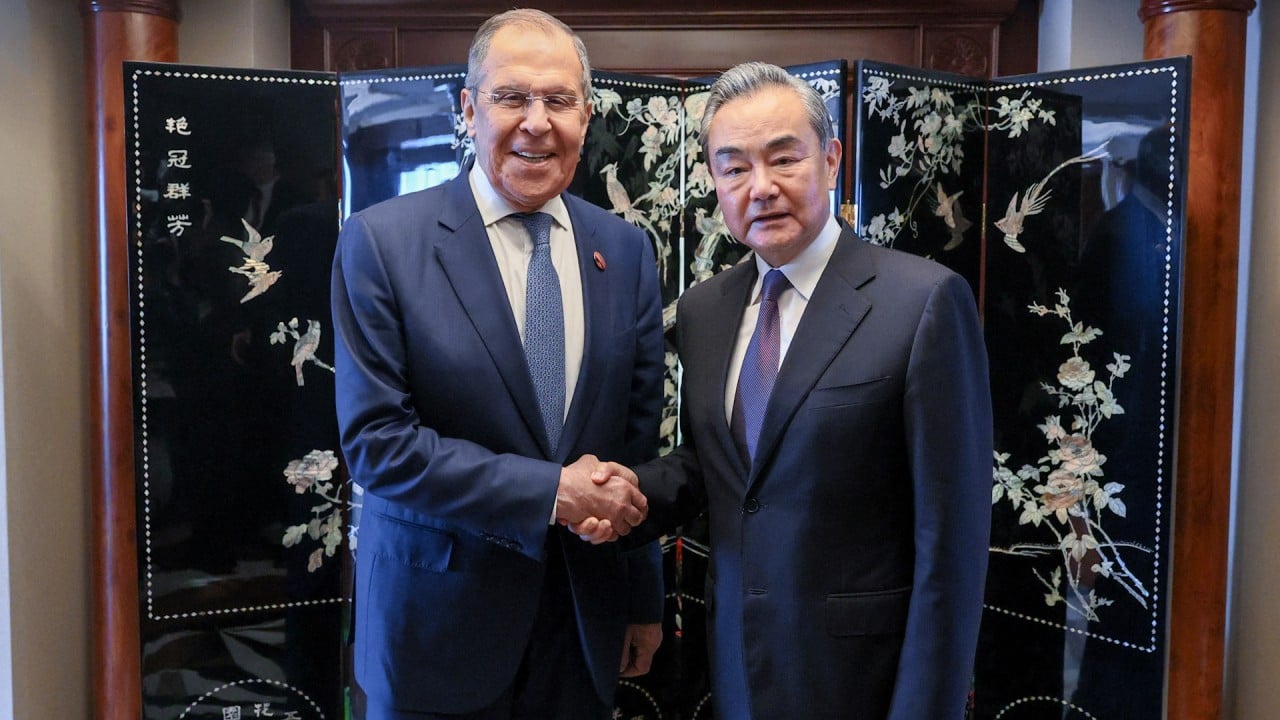
China and Russia make united stand to reform West-led global system
- Xi Jinping tells Russian Foreign Minister Sergey Lavrov that Beijing is prepared to step up coordination with Moscow through Brics and the SCO
- Lavrov hits out at the West over ‘illegal sanctions’ and ‘military and political unions’ against Russia and China
“China has always attached great importance to the development of Sino-Russian relations and is willing to work with Russia to intensify bilateral communication, strengthen multilateral strategic coordination in the Brics group and the Shanghai Cooperation Organisation, demonstrate greater responsibility, unite the ‘Global South’ countries … and promote reform of the global governance system,” state broadcaster CCTV quoted Xi as saying.
Lavrov said Putin’s victory guaranteed “continuity” of Russia-China relations and the “new development of cooperation in all areas”.
“Thanks to the diplomacy of the leaders, Russian-Chinese relations demonstrate stability as well as the ability to adapt to any – even the most difficult – conditions. The basis of Russian-Chinese relations is mutual support on issues affecting the fundamental interests of our states,” he said.
Putin reportedly plans to visit China in May as the two countries mark the 75th anniversary of diplomatic relations but Russian presidential press secretary Dmitry Peskov said on Tuesday that he could not confirm the timing of Putin’s visit.
Lavrov’s trip comes as Beijing and Moscow both step up ties with countries in the Global South, moves widely seen as attempted to counter the Western-led global order.
‘No plans’: Australia denies Japan poised to formally join Aukus pact
The United States, meanwhile, is also stepping up strategic coordination in the Asia-Pacific with an eye on Russia and China. The leaders of Japan and the Philippines will be in Washington this week for a three-way summit and the US, Britain, and Australia are considering cooperation with Japan under the Aukus security pact.
In a press conference with Lavrov on Tuesday, Chinese Foreign Minister Wang Yi urged the US and its allies not to “extend their hands” to the Asia-Pacific region.
“[We] oppose any small circles that engage in bloc confrontation. Nato should not extend their hands to our common home … in the Asia-Pacific. Any words or deeds that are divisive and confrontational have no market or future in the Asia-Pacific region,” he said.
Lavrov also hit out at the West over “illegal sanctions” and “military and political unions” against Russia and China, which he said were attempts to disrupt a multipolar world order. He reaffirmed that Russia and China would stand “back-to-back, shoulder to shoulder” amid such attempts.
“Our leaders … have repeatedly emphasised the determination of Russia and China to counter attempts to slow down the formation of a multipolar world, the long-overdue processes of democratisation and justice that are ‘knocking on the door’ of the modern world order,” he said.
“The United States and its allies, in an effort to perpetuate their unjust position in the international system, are trying to stop them.”
Wang and Lavrov also said their countries would work together to defend multipolarity.
“Both China and Russia … oppose hegemonism and power politics, and oppose the monopoly of international affairs by a few countries,” Wang said.
“China and Russia will continue to … advocate inclusive economic globalisation, jointly oppose unilateralism, protectionism, fence-building and decoupling, and work together to maintain the stability of international industrial and industrial chains.”
Why Russia might be warming to China’s belt and road plans in Central Asia
Russia’s war in Ukraine has spurred Western distrust over Russia’s ties with China, and the West has repeatedly warned China not to give any material support to Russia’s war efforts.
Some Chinese companies have already been sanctioned by the European Union for allegedly circumventing the bloc’s sanctions on Russia, prompting strong opposition from Beijing.
Calling relations with China at an “unprecedentedly high level”, Lavrov vowed to increase coordination with China within Brics and the SCO, including to solve sanctions-related issues.
Both countries will also launch talks on Eurasian security and continue cooperation on anti-terrorism, according to Lavrov.
Isis-K claimed responsibility for the Moscow attack that killed at least 140 civilians but Russia sought to lay blame on Ukraine – allegations Kyiv has strongly denied.
With the fighting in Ukraine in its third year and the Moscow-controlled Zaporizhzhia nuclear power plant struck by drones again over the weekend, Wang renewed China’s call for a ceasefire and a timely convening of international peace conference, with “equal participation” of all involved parties.
Lavrov said he and Wang agreed that any international summit that did not take Russia’s position and interests into consideration would not bring any result.
China reportedly pushed for Russia to be invited to an upcoming summit on Ukraine in Switzerland but the proposal received little interest. European officials called it a “non-starter”, and Kyiv and Moscow both rejected the idea.

 - Kawala Xie.jpg?itok=NogZcyZ-&v=1661304068)
